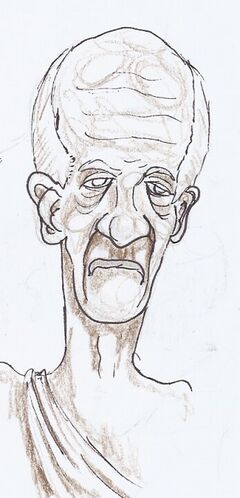Ibid: Difference between revisions
m (1 revision: Discworld import) |
No edit summary |
||
| Line 18: | Line 18: | ||
He is one of a crowd that disputes in taverns and coins aphorisms, axioms and paradoxes for money. An example is "Thesis plus antithesis equals hysteresis". | He is one of a crowd that disputes in taverns and coins aphorisms, axioms and paradoxes for money. An example is "Thesis plus antithesis equals hysteresis". | ||
He is also | He is also encountered in {{P}} where we learn he has published several papers including ''[[Principles of Ideal Government]]'' and a ''[[Discourse on Historical Inevitability]]''. | ||
==Annotation== | ==Annotation== | ||
Revision as of 21:43, 8 November 2012
| Ibid | |
 | |
| Name | Ibid |
| Race | Human |
| Age | elderly |
| Occupation | Ephebian Philosopher |
| Physical appearance | Elderly, wearing a loincloth, described as tall and willowy. |
| Residence | Ephebe |
| Death | {{{death}}} |
| Parents | {{{parents}}} |
| Relatives | {{{relatives}}} |
| Children | {{{children}}} |
| Marital Status | {{{marital status}}} |
| Appearances | |
| Books | Pyramids, Small Gods |
| Cameos | {{{cameos}}} |
Ibid is one of the Ephebian Philosophers encountered by Brutha and the Omnians during the events of Small Gods. Like his contemporaries, Xeno, Didactylos and others, Ibid is an amalgam of Roundworld counterparts from ancient history - mainly Greek philosophers. He wrote the Discourses and thus parallels Roundworld's Epictetus.
He is one of a crowd that disputes in taverns and coins aphorisms, axioms and paradoxes for money. An example is "Thesis plus antithesis equals hysteresis".
He is also encountered in Pyramids where we learn he has published several papers including Principles of Ideal Government and a Discourse on Historical Inevitability.
Annotation
According to the Annotated Pratchett File this is a play on the central tenet of dialectical materialism, which was lifted (by Marx and Engels) from Hegelian philosophy: "Thesis plus antithesis yields synthesis".
The British Army has a variant: "Order plus counter-order equals disorder".
Also, in Roundworld, ibid., short for ibidem, 'the same place', is used in an endnote or footnote citation for a source cited in the previous endnote or footnote. This neatly ties in with the fact that Ibid 'thinks he's the biggest bloody authority on everything'.
This joke was also used by Illuminatus! author Robert Anton Wilson, when he created the greatest classical authority, Ibid of Anon.